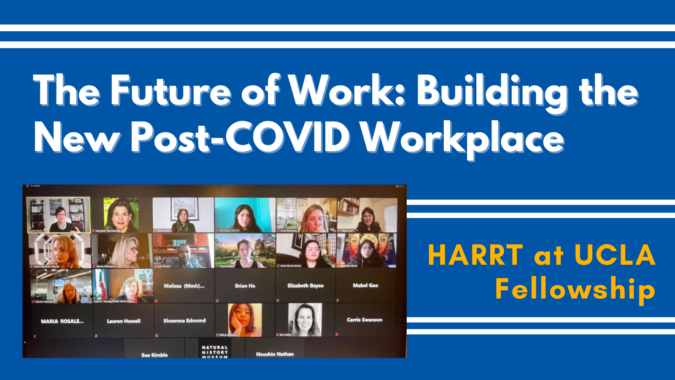Inaugural fellowship prepares students for careers in human resources
Breanna Diaz | May 4, 2021
The first of its kind, a new fellowship for UCLA students is bridging the gap between the workplace and the classroom.
The Human Resources Round Table (HARRT) at UCLA began its first fellowship for students spring quarter, titled “The Future of Work: Building the New Post-COVID Workplace.” HARRT, a unit of the Institute for Research on Labor and Employment (IRLE), serves as a forum and network for human resources professionals as they develop forward-thinking strategies to address issues facing the workplace and human resources.
Now, the unit is bringing its human resources and workplace know-how to UCLA students, as the fellowship promises hands-on experience and valuable lessons on building inclusive and equitable workplaces.
HARRT members were looking for ways to integrate the unit with students and labor studies, Associate Director of HARRT Marybeth Vita-Edwards said. “There has been a need within our own organization … to reach out to the newer generation, the younger incoming generation of students who are interested in going into HR,” Vita Edwards said. “It was just a perfect kind of match when we were trying to decide how to give back.”
The COVID-19 pandemic also created a heightened awareness among employers about how to address their employees’ well-being, said HARRT Executive Director Ellen Sheehan. The curriculum and lessons taught in the fellowship were based on how to create an enhanced and collaborative experience for employees.
Part of the learning experience includes hearing from guest speakers and human resource professionals, Sheehan said. Topics include psychological safety in organizations (ensuring employees feel safe taking risks and raising concerns or ideas), people analytics, and strategies for inclusion when workplaces shift to hybrid models in the future. The fellowship, which takes place over the course of the quarter, also includes participation in a book club, meeting with mentors and a career panel at the end of the program.
For IRLE director and fellowship instructor Abel Valenzuela Jr., workshops within the fellowship needed to be relevant to students and provide opportunities for professional development to ensure the curriculum would be useful for students in the long run.
The fellowship was originally planning on admitting six fellows, but after reviewing the nine applicants, Vita Edwards said the IRLE Advisory Committee, who selected the fellows, chose to admit all nine.
Jamie Nicole Reniva, a fourth-year psychology and labor studies student who joined fellowship, said she hadn’t enrolled in human resources courses at UCLA before even though she’s passionate about the topic, so she took the opportunity to learn more about the field and the connection between labor and psychology.
“I really enjoyed learning more about labor in research, but at the same time, the intersection between psychology and labor studies,” Reniva said. “I’m interested in [human resources], but I’m also interested in occupational health [and] ensuring the mental and physical safety of marginalized people of color and immigrant workers.
Psychological safety has been one major point of interest for Reniva, she said. The book club, where fellows read the book “Fearless Organization” by Amy Edmondson, taught the fellows the importance of challenging the status quo and ensuring there is inclusion and equity in the workplace.
Overall, the purpose of the fellowship was to provide first-hand experience into the problems and issues businesses face today, Vita Edwards said. Students will also gain practical exposure to the area of employment through the career panel at the close of the quarter, where students will have their resumes reviewed.
“It’s very important to advocate for all the workers in the workplace,” Reniva said. “So far with what we’ve been learning about psychological safety, I hope to even take it a step further after UCLA and learn more about inclusive workplaces and making sure that all workers’ voices are heard.”
Students admitted in the fellowship are enrolled in Labor Studies 195B and receive 2 units of academic course credit for their internship experience. To graduate with the labor studies major, students must complete research-intensive capstone courses, community-engaged internship experiences, or a combination of both. To learn more about future fellowship opportunities, sign up for the Labor Studies Weekly Happenings Newsletter.


